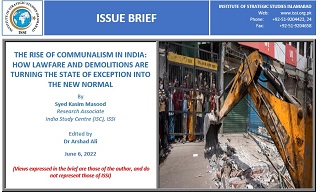In November 2019, while addressing a gathering of Kashmiri Pandits in New York, India’s Consul General had received plenty of flak when advocating for the adoption of an “Israeli Model” in Kashmir.[1] In his remarks, Sandeep Chakravorty, India’s highest-ranking diplomat in New York City, had advocated for the use of settler-colonial tactics that have been used in the West Bank and East Jerusalem. However, recent developments have shown that evictions and demographic changes have become the norm not only in Kashmir but in the rest of India as well.
In order to create space for an influx of settlers, occupying powers must rely on a program of dispossession and disenfranchisement. In 2020 alone, 114 houses were destroyed in Indian-held Kashmir during military operations.[2] The rise of communication blackouts in Kashmir means that obtaining the latest figures is becoming increasingly arduous. While the revocation of Kashmir’s special status on August 5, 2019 was touted by the Indian government as the first step in integrating Jammu & Kashmir with the rest of India, the valley continues to exist in a ‘state of exception’, a space where political and economic disturbances warrant the suspension of constitutional order.[3] According to the Italian philosopher Giorgio Agamben, “the state of exception is neither external nor internal to the juridical order, and the problem of defining it concerns precisely a threshold, or a zone of indifference, where inside and outside do not exclude each other but rather blur with each other.”[4] In this regard, the abrogation of Kashmir’s status on August 5, 2019, has not only failed to normalize the affairs of the region but has in fact normalized the utilization of similar measures in the rest of India as the lines have begun to blur. For example, the use of evictions and destruction of property has recently become the premier tool through which the government tries to forward its agenda of marginalizing India’s Muslims. In Khargone, Madhya Pradesh alone, the district administration, with the blessing of the Madhya Pradesh government, demolished 16 houses and 29 shops.[5] While district administrations in Madhya Pradesh and Uttar Pradesh have claimed that they are only acting against illegal constructions, some of these houses had been built under government schemes.[6] Ajay Singh, a Congress leader in Madhya Pradesh lambasted these egregious violations of the constitution in the state assembly by asking, “The entire Madhya Pradesh is asking if the Rowlatt Act, which provided for no appeal, no justification and did not allow even a lawyer, and which was scrapped during the British period, has come back into force again?”[7] It is clear that this wave of demolitions is meant to intimidate India’s Muslims and to label them as outsiders who do not belong in its urban localities.
















